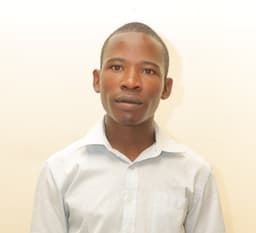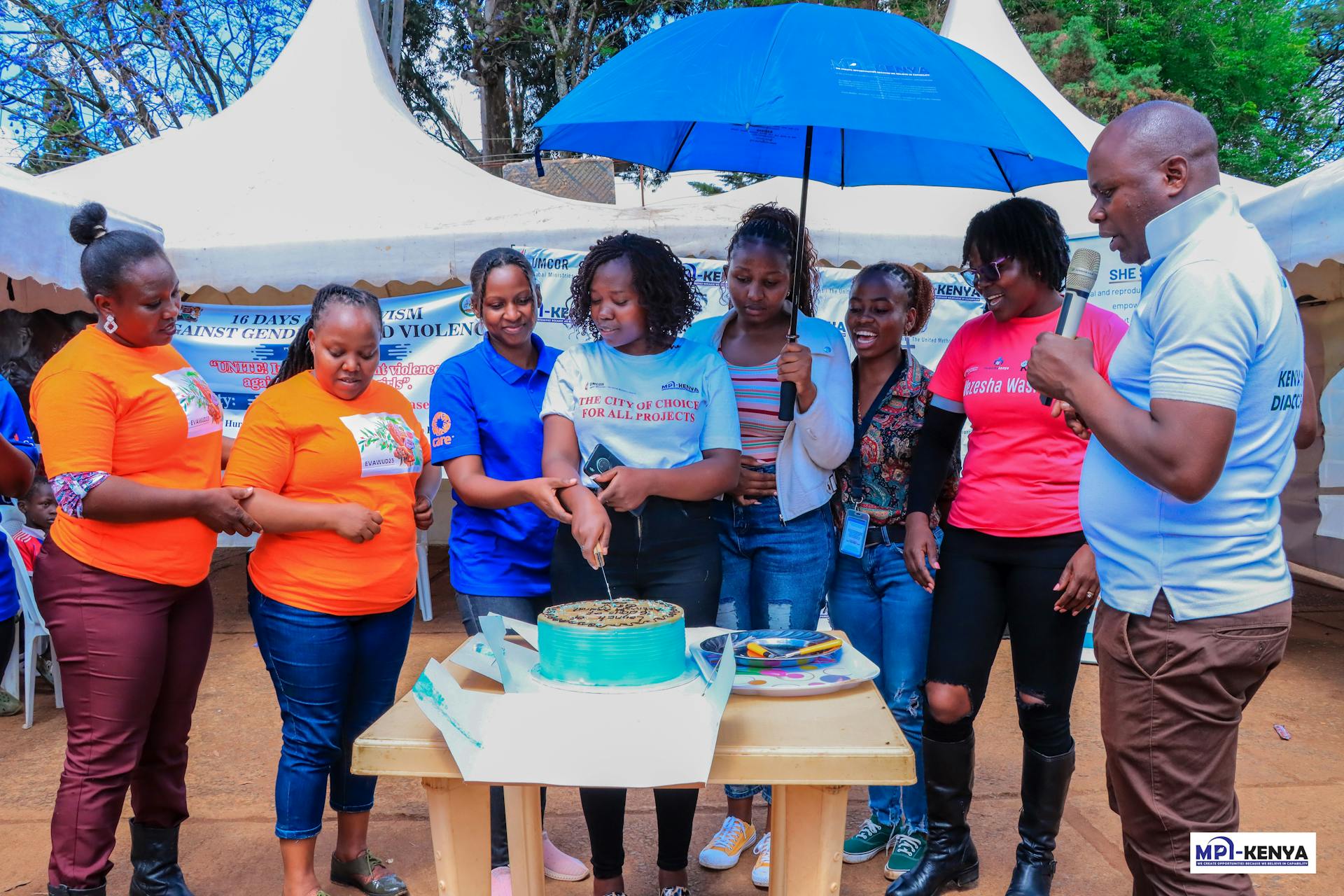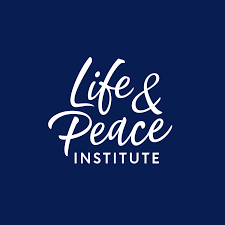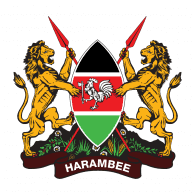About the author

By Michael Oyier, 13th December 2023

16 days of activism against GBV was started by activists at the inaugural Women’s Global Leadership Institute in 1991 and continues to be coordinated each year by individuals and organizations around the world to call for the prevention and elimination of violence against women and girls. This year’s global theme is; “Orange the world: Fund, Respond, Prevent, Collect!” In Mathare and Starehe sub counties, a group of partner organizations lead by Mathare Peace Initiative Kenya in partnership with other organizations joined efforts for the success of the planned activities that covered 16 days.
In 1993, the first attempts to clearly define sexual and gender-based violence was made at the UN Declaration on the Elimination of Violence against Women. Sexual gender-based violence (SGBV) was therefore defined as, “Any harmful act that is perpetrated against one person’s will and that is based on socially ascribed (gender) differences between males and females. This includes acts that inflict physical, mental, or sexual harm or suffering, threats of such acts, coercion and other deprivations of liberty, whether occurring in public or in private life”.
Sexual and gender-based violence entails widespread human rights violations, and is often linked to unequal gender relations within communities and abuses of power. According to Human Rights activists, violence against women is rooted in gender inequality. It arises from the unequal power relationships between men and women. It can take the form of sexual violence or persecution by the authorities, or can be the result of discrimination embedded in legislation or prevailing societal norms and practices. It can be both a cause of forced displacement and an intolerable part of the displacement experience.
Women’s subordinate status to men in many societies, coupled with a general acceptance of interpersonal violence as a means of resolving conflict, renders women disproportionately vulnerable to violence from all levels of society: individual men, within the family and community, and by the state.
According to statistics from the Gender Violence Recovery Centre (GVRC) 45% of women between ages 15–49 in Kenya have experienced either physical or sexual violence with women and girls accounting for 90% of the gender-based violence (GBV) cases reported. This therefore means that, one in five Kenyan women (at least 21%) have experienced sexual or gender-based violence.
The impact of SGBV is devastating. The individual women who are victims of such violence often experience life-long emotional distress, mental health problems and poor reproductive health, as well as being at higher risk of acquiring HIV and intensive long-term users of health services. In addition, the cost to women, their children, families and communities is a significant obstacle to reducing poverty, achieving gender equality and ensuring a peaceful transition for post-conflict societies. This, in conjunction with the mental and physical health implications of gender-based violence, impacts on a state or region’s ability to develop and construct a stable, productive society, or reconstruct a country in the wake of conflict.
16 days of activism against GBV was started by activists at the inaugural Women’s Global Leadership Institute in 1991 and continues to be coordinated each year by individuals and organizations around the world to call for the prevention and elimination of violence against women and girls. This year’s global theme is; “Orange the world: Fund, Respond, Prevent, Collect!” In Mathare and Starehe sub counties, a group of partner organizations lead by Mathare Peace Initiative Kenya in partnership with other organizations joined efforts for the success of the planned activities that covered 16 days.
In 1993, the first attempts to clearly define sexual and gender-based violence was made at the UN Declaration on the Elimination of Violence against Women. Sexual gender-based violence (SGBV) was therefore defined as, “Any harmful act that is perpetrated against one person’s will and that is based on socially ascribed (gender) differences between males and females. This includes acts that inflict physical, mental, or sexual harm or suffering, threats of such acts, coercion and other deprivations of liberty, whether occurring in public or in private life”.
Sexual and gender-based violence entails widespread human rights violations, and is often linked to unequal gender relations within communities and abuses of power. According to Human Rights activists, violence against women is rooted in gender inequality. It arises from the unequal power relationships between men and women. It can take the form of sexual violence or persecution by the authorities, or can be the result of discrimination embedded in legislation or prevailing societal norms and practices. It can be both a cause of forced displacement and an intolerable part of the displacement experience.
Women’s subordinate status to men in many societies, coupled with a general acceptance of interpersonal violence as a means of resolving conflict, renders women disproportionately vulnerable to violence from all levels of society: individual men, within the family and community, and by the state.
According to statistics from the Gender Violence Recovery Centre (GVRC) 45% of women between ages 15–49 in Kenya have experienced either physical or sexual violence with women and girls accounting for 90% of the gender-based violence (GBV) cases reported. This therefore means that, one in five Kenyan women (at least 21%) have experienced sexual or gender-based violence.
The impact of SGBV is devastating. The individual women who are victims of such violence often experience life-long emotional distress, mental health problems and poor reproductive health, as well as being at higher risk of acquiring HIV and intensive long-term users of health services. In addition, the cost to women, their children, families and communities is a significant obstacle to reducing poverty, achieving gender equality and ensuring a peaceful transition for post-conflict societies. This, in conjunction with the mental and physical health implications of gender-based violence, impacts on a state or region’s ability to develop and construct a stable, productive society, or reconstruct a country in the wake of conflict.
16 days of activism against GBV was started by activists at the inaugural Women’s Global Leadership Institute in 1991 and continues to be coordinated each year by individuals and organizations around the world to call for the prevention and elimination of violence against women and girls. This year’s global theme is; “Orange the world: Fund, Respond, Prevent, Collect!” In Mathare and Starehe sub counties, a group of partner organizations lead by Mathare Peace Initiative Kenya in partnership with other organizations joined efforts for the success of the planned activities that covered 16 days.
In 1993, the first attempts to clearly define sexual and gender-based violence was made at the UN Declaration on the Elimination of Violence against Women. Sexual gender-based violence (SGBV) was therefore defined as, “Any harmful act that is perpetrated against one person’s will and that is based on socially ascribed (gender) differences between males and females. This includes acts that inflict physical, mental, or sexual harm or suffering, threats of such acts, coercion and other deprivations of liberty, whether occurring in public or in private life”.
Sexual and gender-based violence entails widespread human rights violations, and is often linked to unequal gender relations within communities and abuses of power. According to Human Rights activists, violence against women is rooted in gender inequality. It arises from the unequal power relationships between men and women. It can take the form of sexual violence or persecution by the authorities, or can be the result of discrimination embedded in legislation or prevailing societal norms and practices. It can be both a cause of forced displacement and an intolerable part of the displacement experience.
Women’s subordinate status to men in many societies, coupled with a general acceptance of interpersonal violence as a means of resolving conflict, renders women disproportionately vulnerable to violence from all levels of society: individual men, within the family and community, and by the state.
According to statistics from the Gender Violence Recovery Centre (GVRC) 45% of women between ages 15–49 in Kenya have experienced either physical or sexual violence with women and girls accounting for 90% of the gender-based violence (GBV) cases reported. This therefore means that, one in five Kenyan women (at least 21%) have experienced sexual or gender-based violence.
The impact of SGBV is devastating. The individual women who are victims of such violence often experience life-long emotional distress, mental health problems and poor reproductive health, as well as being at higher risk of acquiring HIV and intensive long-term users of health services. In addition, the cost to women, their children, families and communities is a significant obstacle to reducing poverty, achieving gender equality and ensuring a peaceful transition for post-conflict societies. This, in conjunction with the mental and physical health implications of gender-based violence, impacts on a state or region’s ability to develop and construct a stable, productive society, or reconstruct a country in the wake of conflict.
16 days of activism against GBV was started by activists at the inaugural Women’s Global Leadership Institute in 1991 and continues to be coordinated each year by individuals and organizations around the world to call for the prevention and elimination of violence against women and girls. This year’s global theme is; “Orange the world: Fund, Respond, Prevent, Collect!” In Mathare and Starehe sub counties, a group of partner organizations lead by Mathare Peace Initiative Kenya in partnership with other organizations joined efforts for the success of the planned activities that covered 16 days.
In 1993, the first attempts to clearly define sexual and gender-based violence was made at the UN Declaration on the Elimination of Violence against Women. Sexual gender-based violence (SGBV) was therefore defined as, “Any harmful act that is perpetrated against one person’s will and that is based on socially ascribed (gender) differences between males and females. This includes acts that inflict physical, mental, or sexual harm or suffering, threats of such acts, coercion and other deprivations of liberty, whether occurring in public or in private life”.
Sexual and gender-based violence entails widespread human rights violations, and is often linked to unequal gender relations within communities and abuses of power. According to Human Rights activists, violence against women is rooted in gender inequality. It arises from the unequal power relationships between men and women. It can take the form of sexual violence or persecution by the authorities, or can be the result of discrimination embedded in legislation or prevailing societal norms and practices. It can be both a cause of forced displacement and an intolerable part of the displacement experience.
Women’s subordinate status to men in many societies, coupled with a general acceptance of interpersonal violence as a means of resolving conflict, renders women disproportionately vulnerable to violence from all levels of society: individual men, within the family and community, and by the state.
According to statistics from the Gender Violence Recovery Centre (GVRC) 45% of women between ages 15–49 in Kenya have experienced either physical or sexual violence with women and girls accounting for 90% of the gender-based violence (GBV) cases reported. This therefore means that, one in five Kenyan women (at least 21%) have experienced sexual or gender-based violence.
The impact of SGBV is devastating. The individual women who are victims of such violence often experience life-long emotional distress, mental health problems and poor reproductive health, as well as being at higher risk of acquiring HIV and intensive long-term users of health services. In addition, the cost to women, their children, families and communities is a significant obstacle to reducing poverty, achieving gender equality and ensuring a peaceful transition for post-conflict societies. This, in conjunction with the mental and physical health implications of gender-based violence, impacts on a state or region’s ability to develop and construct a stable, productive society, or reconstruct a country in the wake of conflict.
16 days of activism against GBV was started by activists at the inaugural Women’s Global Leadership Institute in 1991 and continues to be coordinated each year by individuals and organizations around the world to call for the prevention and elimination of violence against women and girls. This year’s global theme is; “Orange the world: Fund, Respond, Prevent, Collect!” In Mathare and Starehe sub counties, a group of partner organizations lead by Mathare Peace Initiative Kenya in partnership with other organizations joined efforts for the success of the planned activities that covered 16 days.
In 1993, the first attempts to clearly define sexual and gender-based violence was made at the UN Declaration on the Elimination of Violence against Women. Sexual gender-based violence (SGBV) was therefore defined as, “Any harmful act that is perpetrated against one person’s will and that is based on socially ascribed (gender) differences between males and females. This includes acts that inflict physical, mental, or sexual harm or suffering, threats of such acts, coercion and other deprivations of liberty, whether occurring in public or in private life”.
Sexual and gender-based violence entails widespread human rights violations, and is often linked to unequal gender relations within communities and abuses of power. According to Human Rights activists, violence against women is rooted in gender inequality. It arises from the unequal power relationships between men and women. It can take the form of sexual violence or persecution by the authorities, or can be the result of discrimination embedded in legislation or prevailing societal norms and practices. It can be both a cause of forced displacement and an intolerable part of the displacement experience.
Women’s subordinate status to men in many societies, coupled with a general acceptance of interpersonal violence as a means of resolving conflict, renders women disproportionately vulnerable to violence from all levels of society: individual men, within the family and community, and by the state.
According to statistics from the Gender Violence Recovery Centre (GVRC) 45% of women between ages 15–49 in Kenya have experienced either physical or sexual violence with women and girls accounting for 90% of the gender-based violence (GBV) cases reported. This therefore means that, one in five Kenyan women (at least 21%) have experienced sexual or gender-based violence.
The impact of SGBV is devastating. The individual women who are victims of such violence often experience life-long emotional distress, mental health problems and poor reproductive health, as well as being at higher risk of acquiring HIV and intensive long-term users of health services. In addition, the cost to women, their children, families and communities is a significant obstacle to reducing poverty, achieving gender equality and ensuring a peaceful transition for post-conflict societies. This, in conjunction with the mental and physical health implications of gender-based violence, impacts on a state or region’s ability to develop and construct a stable, productive society, or reconstruct a country in the wake of conflict.
16 days of activism against GBV was started by activists at the inaugural Women’s Global Leadership Institute in 1991 and continues to be coordinated each year by individuals and organizations around the world to call for the prevention and elimination of violence against women and girls. This year’s global theme is; “Orange the world: Fund, Respond, Prevent, Collect!” In Mathare and Starehe sub counties, a group of partner organizations lead by Mathare Peace Initiative Kenya in partnership with other organizations joined efforts for the success of the planned activities that covered 16 days.
In 1993, the first attempts to clearly define sexual and gender-based violence was made at the UN Declaration on the Elimination of Violence against Women. Sexual gender-based violence (SGBV) was therefore defined as, “Any harmful act that is perpetrated against one person’s will and that is based on socially ascribed (gender) differences between males and females. This includes acts that inflict physical, mental, or sexual harm or suffering, threats of such acts, coercion and other deprivations of liberty, whether occurring in public or in private life”.
Sexual and gender-based violence entails widespread human rights violations, and is often linked to unequal gender relations within communities and abuses of power. According to Human Rights activists, violence against women is rooted in gender inequality. It arises from the unequal power relationships between men and women. It can take the form of sexual violence or persecution by the authorities, or can be the result of discrimination embedded in legislation or prevailing societal norms and practices. It can be both a cause of forced displacement and an intolerable part of the displacement experience.
Women’s subordinate status to men in many societies, coupled with a general acceptance of interpersonal violence as a means of resolving conflict, renders women disproportionately vulnerable to violence from all levels of society: individual men, within the family and community, and by the state.
According to statistics from the Gender Violence Recovery Centre (GVRC) 45% of women between ages 15–49 in Kenya have experienced either physical or sexual violence with women and girls accounting for 90% of the gender-based violence (GBV) cases reported. This therefore means that, one in five Kenyan women (at least 21%) have experienced sexual or gender-based violence.
The impact of SGBV is devastating. The individual women who are victims of such violence often experience life-long emotional distress, mental health problems and poor reproductive health, as well as being at higher risk of acquiring HIV and intensive long-term users of health services. In addition, the cost to women, their children, families and communities is a significant obstacle to reducing poverty, achieving gender equality and ensuring a peaceful transition for post-conflict societies. This, in conjunction with the mental and physical health implications of gender-based violence, impacts on a state or region’s ability to develop and construct a stable, productive society, or reconstruct a country in the wake of conflict.
16 days of activism against GBV was started by activists at the inaugural Women’s Global Leadership Institute in 1991 and continues to be coordinated each year by individuals and organizations around the world to call for the prevention and elimination of violence against women and girls. This year’s global theme is; “Orange the world: Fund, Respond, Prevent, Collect!” In Mathare and Starehe sub counties, a group of partner organizations lead by Mathare Peace Initiative Kenya in partnership with other organizations joined efforts for the success of the planned activities that covered 16 days.
In 1993, the first attempts to clearly define sexual and gender-based violence was made at the UN Declaration on the Elimination of Violence against Women. Sexual gender-based violence (SGBV) was therefore defined as, “Any harmful act that is perpetrated against one person’s will and that is based on socially ascribed (gender) differences between males and females. This includes acts that inflict physical, mental, or sexual harm or suffering, threats of such acts, coercion and other deprivations of liberty, whether occurring in public or in private life”.
Sexual and gender-based violence entails widespread human rights violations, and is often linked to unequal gender relations within communities and abuses of power. According to Human Rights activists, violence against women is rooted in gender inequality. It arises from the unequal power relationships between men and women. It can take the form of sexual violence or persecution by the authorities, or can be the result of discrimination embedded in legislation or prevailing societal norms and practices. It can be both a cause of forced displacement and an intolerable part of the displacement experience.
Women’s subordinate status to men in many societies, coupled with a general acceptance of interpersonal violence as a means of resolving conflict, renders women disproportionately vulnerable to violence from all levels of society: individual men, within the family and community, and by the state.
According to statistics from the Gender Violence Recovery Centre (GVRC) 45% of women between ages 15–49 in Kenya have experienced either physical or sexual violence with women and girls accounting for 90% of the gender-based violence (GBV) cases reported. This therefore means that, one in five Kenyan women (at least 21%) have experienced sexual or gender-based violence.
The impact of SGBV is devastating. The individual women who are victims of such violence often experience life-long emotional distress, mental health problems and poor reproductive health, as well as being at higher risk of acquiring HIV and intensive long-term users of health services. In addition, the cost to women, their children, families and communities is a significant obstacle to reducing poverty, achieving gender equality and ensuring a peaceful transition for post-conflict societies. This, in conjunction with the mental and physical health implications of gender-based violence, impacts on a state or region’s ability to develop and construct a stable, productive society, or reconstruct a country in the wake of conflict.
16 days of activism against GBV was started by activists at the inaugural Women’s Global Leadership Institute in 1991 and continues to be coordinated each year by individuals and organizations around the world to call for the prevention and elimination of violence against women and girls. This year’s global theme is; “Orange the world: Fund, Respond, Prevent, Collect!” In Mathare and Starehe sub counties, a group of partner organizations lead by Mathare Peace Initiative Kenya in partnership with other organizations joined efforts for the success of the planned activities that covered 16 days.
In 1993, the first attempts to clearly define sexual and gender-based violence was made at the UN Declaration on the Elimination of Violence against Women. Sexual gender-based violence (SGBV) was therefore defined as, “Any harmful act that is perpetrated against one person’s will and that is based on socially ascribed (gender) differences between males and females. This includes acts that inflict physical, mental, or sexual harm or suffering, threats of such acts, coercion and other deprivations of liberty, whether occurring in public or in private life”.
Sexual and gender-based violence entails widespread human rights violations, and is often linked to unequal gender relations within communities and abuses of power. According to Human Rights activists, violence against women is rooted in gender inequality. It arises from the unequal power relationships between men and women. It can take the form of sexual violence or persecution by the authorities, or can be the result of discrimination embedded in legislation or prevailing societal norms and practices. It can be both a cause of forced displacement and an intolerable part of the displacement experience.
Women’s subordinate status to men in many societies, coupled with a general acceptance of interpersonal violence as a means of resolving conflict, renders women disproportionately vulnerable to violence from all levels of society: individual men, within the family and community, and by the state.
According to statistics from the Gender Violence Recovery Centre (GVRC) 45% of women between ages 15–49 in Kenya have experienced either physical or sexual violence with women and girls accounting for 90% of the gender-based violence (GBV) cases reported. This therefore means that, one in five Kenyan women (at least 21%) have experienced sexual or gender-based violence.
The impact of SGBV is devastating. The individual women who are victims of such violence often experience life-long emotional distress, mental health problems and poor reproductive health, as well as being at higher risk of acquiring HIV and intensive long-term users of health services. In addition, the cost to women, their children, families and communities is a significant obstacle to reducing poverty, achieving gender equality and ensuring a peaceful transition for post-conflict societies. This, in conjunction with the mental and physical health implications of gender-based violence, impacts on a state or region’s ability to develop and construct a stable, productive society, or reconstruct a country in the wake of conflict.
In the foregoing and in the interest of promoting Mathare Peace Initiative’s vision of having a society of justice and equality for all, MPI Kenya in partnership with various organization like MSF, SWOP-K, NCC, KRCS, HWWK, NMS, Nzumari Africa, MPC, YIC, Dream Sisterhood Foundation, among others organized a wonderful event for the celebration and commemoration of 16 Days of activism against GBV in Mathare and Starehe sub-counties. They conducted an intensive and inclusive sexual and gender-based outreach forums that encouraged everyone in the society to speak against any form of violence and to take action in reporting and preventing all forms of violence against gender at their level.
← More blog posts
ICT Specialist and M&E Officer at MPI Kenya

